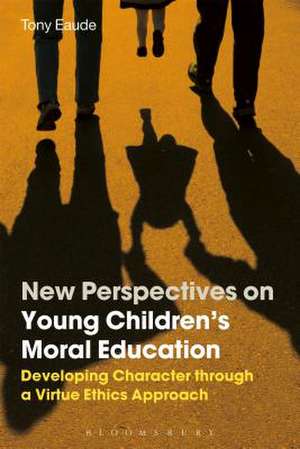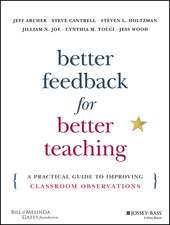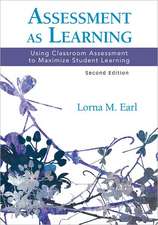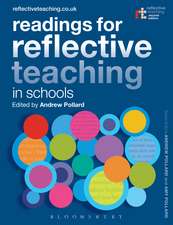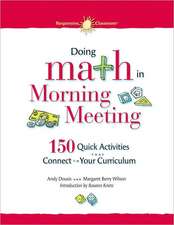New Perspectives on Young Children's Moral Education: Developing Character through a Virtue Ethics Approach
Autor Dr Tony Eaudeen Limba Engleză Paperback – 16 dec 2015
| Toate formatele și edițiile | Preț | Express |
|---|---|---|
| Paperback (1) | 250.45 lei 3-5 săpt. | |
| Bloomsbury Publishing – 16 dec 2015 | 250.45 lei 3-5 săpt. | |
| Hardback (1) | 889.88 lei 6-8 săpt. | |
| Bloomsbury Publishing – 16 dec 2015 | 889.88 lei 6-8 săpt. |
Preț: 250.45 lei
Preț vechi: 308.03 lei
-19% Nou
Puncte Express: 376
Preț estimativ în valută:
47.93€ • 49.51$ • 39.89£
47.93€ • 49.51$ • 39.89£
Carte disponibilă
Livrare economică 04-18 martie
Preluare comenzi: 021 569.72.76
Specificații
ISBN-13: 9781472596468
ISBN-10: 1472596463
Pagini: 216
Dimensiuni: 156 x 234 x 13 mm
Greutate: 0.34 kg
Editura: Bloomsbury Publishing
Colecția Bloomsbury Academic
Locul publicării:London, United Kingdom
ISBN-10: 1472596463
Pagini: 216
Dimensiuni: 156 x 234 x 13 mm
Greutate: 0.34 kg
Editura: Bloomsbury Publishing
Colecția Bloomsbury Academic
Locul publicării:London, United Kingdom
Caracteristici
Explores how ideas such as character, values and virtue can help children to act and interact appropriately and adults to support them to do so
Notă biografică
Tony Eaude is a Norham Fellow in the Department of Education, University of Oxford, UK, and an independent research consultant. Tony was the headteacher of a primary school for nine years and has authored several successful books, including Children's Spiritual, Moral, Social and Cultural Development - Primary and Early Years (2008), Thinking Through Pedagogy for Primary and Early Years (2011) and How do Expert Primary Classteachers Really Work? (2012).
Cuprins
IntroductionPart I: The Context of Young Children's Moral Education1. The Landscape of Moral Education2. The Basis of Ethics3. The Changing Social and Cultural Context4. The Educational ContextPart II: The Roots of Moral Development5. How Young Children Learn6. Culture, Identity and Motivation7. Learning to Live a Good LifePart III: Routes into Moral Education8. Inclusive Learning Environments9. Encouraging Empathy and Thoughtfulness10. Moving Beyond Separate Programmes11. Gathering the ThreadsBibliography Index
Recenzii
New Perspectives on Young Children's Moral Education is a wide-ranging text with an impressive academic compass embracing many different but related aspects of the world of the young child ... this is a timely text in its exploration of the complexities in socialisation and the pervasive role played by educational agencies on the one hand and peer groups on the other ... The strength of the book resides in part in the particular personal biography the author, Tony Eaude, is able to invest in his work.
This book, both in its careful philosophical analysis and in the primacy it gives to understanding the wider social context, and the development of children within that context, provides a major contribution to how we should think about moral development and education. It has the added virtue of being very readable, with the sort of illustration with which teachers and parents can identify.
[A] clear, accessible and well-thought out book which brings a much needed humanistic approach to education back into focus and provides a strong theoretical basis for taking it seriously.
Tony Eaude has written not just a book here but a tapestry. He skilfully weaves research from child development, neuroscience and education together in a way that leaves the reader truly well informed about the topic and its complexity. Moral development and its promotion is at the core of a child's education journey and Tony addresses the subject's deep questions head on but in a writing style that is immediately accessible to the reader. His knowledge is impressive and he communicates it beautifully. The book is comprehensive, informative and engrossing. A read for all educators.
How do we encourage children to live 'a good life'? Eaude offers an approach based on intrinsic motivation and character development rather than external pressure and shaming. His critical assessment of the goals and challenges of moral education, coupled with twelve principles for teachers and parents/carers, make this book an essential read.
Eaude's work is thorough and comprehensive, calling for an inclusive approach to moral education that permeates the whole of children's lives. His focus on agency, habituation and feedback in the context of caring relationships is refreshing. Grounded in accessible research, this is a highly recommended resource for early childhood educators.
Tony Eaude has achieved something which no other writer on moral education has achieved, namely, the integration, on the on hand, of a sound analysis of what is meant by moral education in different philosophical traditions with, on the other, the experiential knowledge of a sensitive teacher and head teacher. The account of moral education draws widely on relevant philosophical literature as well as empirical work from psychology and sociology. Yet he manages to do this in a language which makes the book accessible to teachers and parents . Given the importance now attached to personal and social education, this book should be a major text in the professional development and initial training of teachers.
Moral education is probably the most neglected area of the curriculum, and teachers often receive little training to support confident engagement with the topic. This book presents a strong case for prioritising moral education and guides the reader through a number of practical approaches that will help to develop children's moral understanding and imagination. It should be essential reading for all teachers in primary schools.
Fantastic and informative read that will be a good addition to our recommended texts.
I am actually amazed how well the author manages to weave together various aspects relating to the moral education of young children and for non-philosophical students I imagine that he might open up this field of study.
This book, both in its careful philosophical analysis and in the primacy it gives to understanding the wider social context, and the development of children within that context, provides a major contribution to how we should think about moral development and education. It has the added virtue of being very readable, with the sort of illustration with which teachers and parents can identify.
[A] clear, accessible and well-thought out book which brings a much needed humanistic approach to education back into focus and provides a strong theoretical basis for taking it seriously.
Tony Eaude has written not just a book here but a tapestry. He skilfully weaves research from child development, neuroscience and education together in a way that leaves the reader truly well informed about the topic and its complexity. Moral development and its promotion is at the core of a child's education journey and Tony addresses the subject's deep questions head on but in a writing style that is immediately accessible to the reader. His knowledge is impressive and he communicates it beautifully. The book is comprehensive, informative and engrossing. A read for all educators.
How do we encourage children to live 'a good life'? Eaude offers an approach based on intrinsic motivation and character development rather than external pressure and shaming. His critical assessment of the goals and challenges of moral education, coupled with twelve principles for teachers and parents/carers, make this book an essential read.
Eaude's work is thorough and comprehensive, calling for an inclusive approach to moral education that permeates the whole of children's lives. His focus on agency, habituation and feedback in the context of caring relationships is refreshing. Grounded in accessible research, this is a highly recommended resource for early childhood educators.
Tony Eaude has achieved something which no other writer on moral education has achieved, namely, the integration, on the on hand, of a sound analysis of what is meant by moral education in different philosophical traditions with, on the other, the experiential knowledge of a sensitive teacher and head teacher. The account of moral education draws widely on relevant philosophical literature as well as empirical work from psychology and sociology. Yet he manages to do this in a language which makes the book accessible to teachers and parents . Given the importance now attached to personal and social education, this book should be a major text in the professional development and initial training of teachers.
Moral education is probably the most neglected area of the curriculum, and teachers often receive little training to support confident engagement with the topic. This book presents a strong case for prioritising moral education and guides the reader through a number of practical approaches that will help to develop children's moral understanding and imagination. It should be essential reading for all teachers in primary schools.
Fantastic and informative read that will be a good addition to our recommended texts.
I am actually amazed how well the author manages to weave together various aspects relating to the moral education of young children and for non-philosophical students I imagine that he might open up this field of study.
